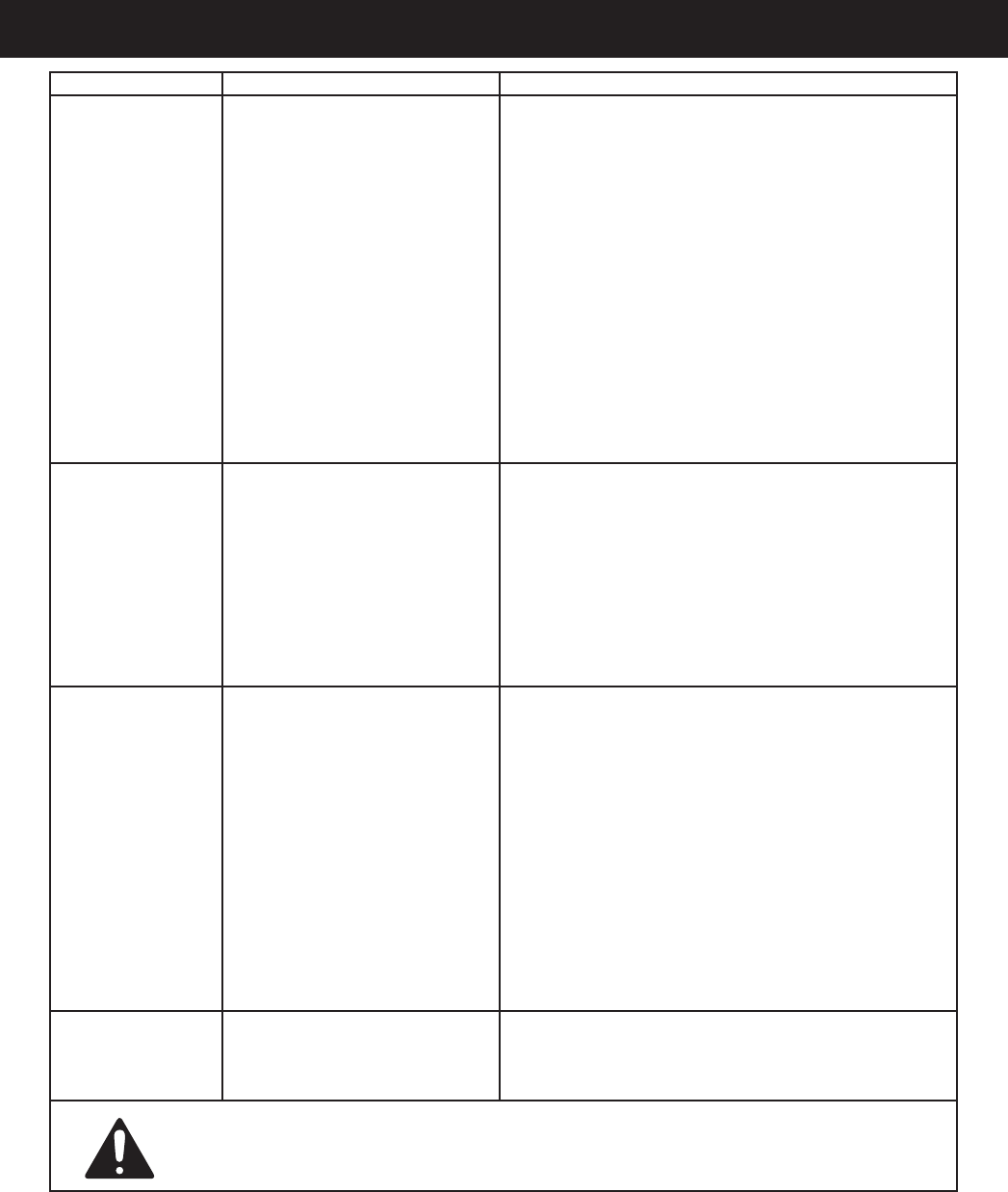
Page 14
For technical questions, please call 1-800-444-3353.
SKU 67501/68740
Troubleshooting
Problem Possible Causes Likely Solutions
Compressor does
not start or restart
1. Incorrect power supply.
2. No power at outlet.
3. Power cord not plugged in
properly.
4. Thermal overload switch
tripped.
5. Building power supply circuit
tripped or blown fuse.
6. Tanks are pressurized.
7. Cord wire size is too small or
cord is too long to properly
power compressor.
8. Compressor needs service.
1. Check that circuit matches compressor requirements.
2. Reset circuit breaker, or have outlet serviced by a
qualied technician.
3. Check that cord is plugged in securely.
4. Turn off Tool. Turn off Compressor and wait for it to
cool down. Press reset button. Resume operation.
5. Reset circuit or replace fuse. Check for low voltage
conditions. It may be necessary to disconnect other
electrical appliances from the circuit or move the
compressor to its own circuit.
6. Fully bleed tanks of air.
7. Use larger diameter or shorter extension cord or
eliminate extension cord. See Recommended Wire
Gauge for Extension Cords in Safety section.
8. Have unit inspected by a qualied technician.
Compressor builds
pressure too slowly
1. Incorrect power supply.
2. Crankcase overlled with oil or
oil too thick.
3. Working environment too cold.
4. Safety valve needs service.
5. Loose ttings.
1. Check that circuit matches compressor requirements.
2. Drain oil and rell to proper level with recommended
oil.
3. Move unit to a warmer location. Check that
recommended oil is in crankcase.
4. Listen for air leaking from valve. If leaking
replace with identical valve with same rating.
5. Reduce air pressure, then check all ttings with a soap
solution for air leaks and tighten as needed. Do not
overtighten.
Compressor not
building enough air
pressure
1. Filters need cleaning/replacing.
2. Crankcase oil too thick.
3. Check Valve needs service.
4. Compressor not large enough
for job.
5. Loose ttings.
6. Hose or hose connections not
adequate.
7. High altitude reducing air
output.
1. Check inlet and outlet lters. Clean and/or replace as
needed.
2. Drain oil and rell to proper level with recommended
oil.
3. Clean or replace, as needed.
4. Check if accessory SCFM is met by Compressor. If
Compressor cannot supply enough air ow (SCFM),
you need a larger Compressor.
5. Reduce air pressure, then check all ttings with a soap
solution for air leaks and tighten as needed. Do not
overtighten.
6. Replace with larger hose and/or hose connections.
7. You may need a larger compressor if you are situated
in a high altitude location.
High Oil
Consumption
1. Crankcase oil too thin.
2. Unit not on level surface.
3. Crankcase vents clogged.
1. Drain oil and rell to proper level with recommended
oil.
2. Reposition unit on a level surface.
3. Clean Crankcase vents.
Follow all safety precautions whenever diagnosing or servicing the
compressor. Disconnect power supply before service.


















